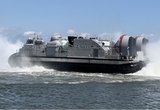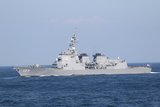US approves almost $1 billion helicopter sale to Spain
Spain is set to enlarge its helicopter fleet with a new acquisition of US MH-60Rs. (Photo: US Navy)
The US State Department approved an FMS to Spain for eight MH-60R helicopters and associated equipment and weaponry for $950 million on 16 March.
The principal contractor for the deal will be Lockheed Martin Rotary and Mission Systems, Owego, NY.
The MH-60Rs will primarily provide the capability to perform anti-surface and anti-submarine warfare missions, while secondary missions include vertical replenishment, SAR and communications relay.
In terms of weaponry, the deal lists hellfire missile launchers, GAU-21 crew-served guns, LAU-61 rocket launchers, APKWS II capabilities and associated ammunition.
The aircraft will come readily equipped with a range of non-lethal equipment such as radio terminals, IFF transponders, radars and more.
The contract includes follow-on services such as repairs, parts, personnel training and engineering and logistical support.
As indicated in the announcement, the helicopters will be delivered to the Spanish Navy and support its ability to remain interoperable with US and NATO allies.
According to Shephard Defence Insight, Spain currently operates 14 SH-60Bs, from which the MH-60R is derived.
Related Programmes in Defence Insight
Related Equipment in Defence Insight
More from Naval Warfare
-
![Intermarine and Leonardo unite for Italian Navy minehunter contract]()
Intermarine and Leonardo unite for Italian Navy minehunter contract
Five modern minehunters will undertake sweeps of leading maritime areas of interest.
-
![Lockheed Martin strengthens Spanish SPY-7 radar supply chain]()
Lockheed Martin strengthens Spanish SPY-7 radar supply chain
The global defence giant chose a Spanish firm for its work on the Bonifaz-class frigate.
-
![Oostende mine countermeasures vessel begins sea trials]()
Oostende mine countermeasures vessel begins sea trials
The first vessel in the Belgian-Dutch rMCM mine-clearing fleet, the Oostende, has begun its sea trials before officially entering service in 2025.
-
![US Navy places $312 million contract with Textron Systems for landing craft]()
US Navy places $312 million contract with Textron Systems for landing craft
Textron’s latest order for Ship to Shore Connector (SSC), Landing Craft, Air Cushion (LCAC) follows on from a contract placed in August 2023 for five LCAC.
-
Japan to boost surface fleet with new destroyers and missile ships
Japan is enhancing its naval capabilities with the construction of the 13DDX advanced destroyer and Aegis System Equipped Vessels (AESV), aiming to strengthen its air and missile defence amid increasing security threats, particularly in East Asia.























